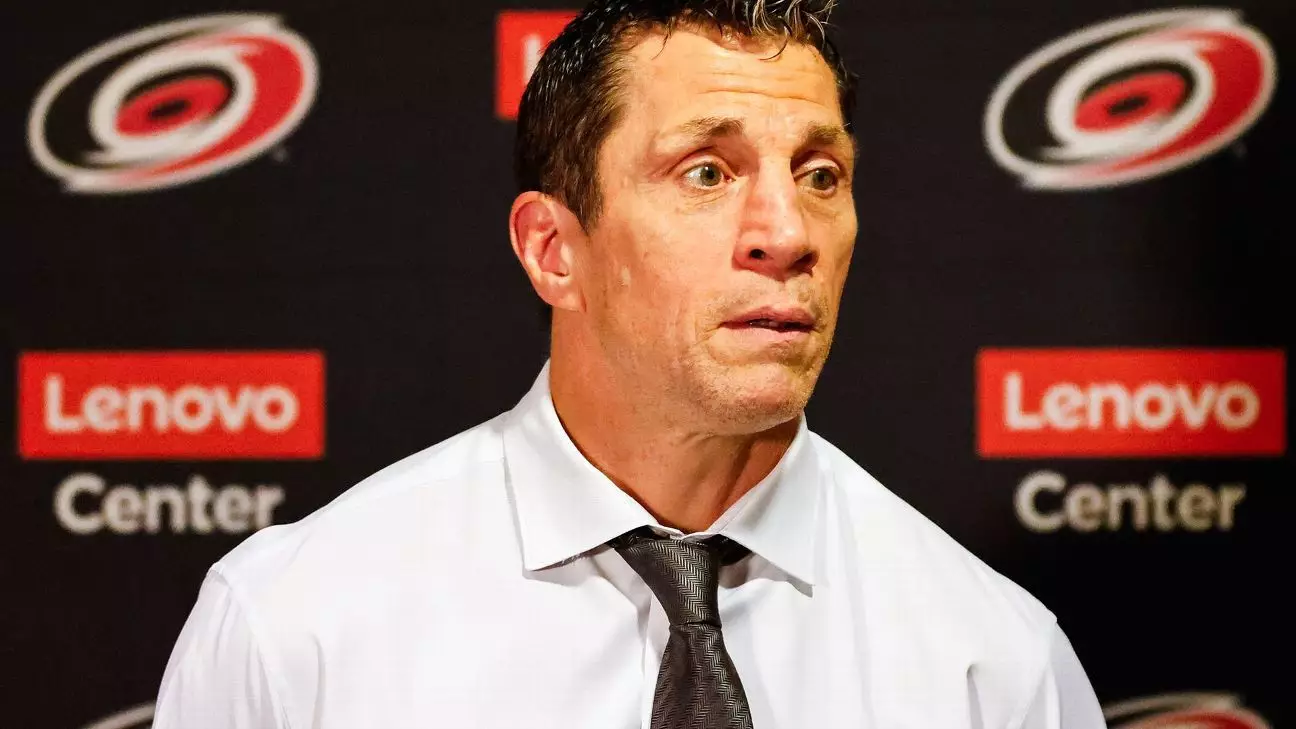The handshake line following an NHL playoff series has long been regarded as one of the sport’s most cherished traditions—a tactile expression of respect between players who have just engaged in a grueling battle on the ice. As the Carolina Hurricanes’ coach Rod Brind’Amour recently observed, this ritual transcends mere formalities; it serves as a moment for personal connection that often fosters camaraderie among competitors. However, the recent assertion by Florida Panthers coach Paul Maurice to exclude coaches from this age-old ceremony has sparked a vital conversation about the essence and relevance of the handshake line.
Changing Traditions: Maurice’s Proposal
Maurice argues that the spotlight should rest solely on the players, believing that the handshake line is a manifestation of the players’ struggles, not the sidelines. In this evolving narrative, he contends that with hundreds of coaches and staff members flooding the ice after each series, the authenticity of the handshake is diminished. His invitation to fellow coaches, including Brind’Amour, to discreetly withdraw during this pivotal moment, ultimately seeks to magnify the significance of the players’ experiences, but it also raises questions about tradition and legacy in the sport.
His perspective is indeed compelling, pinpointing a desire to streamline the focus during a moment that should encapsulate the spirit of sportsmanship. Yet, in an era where we constantly adjust our traditions to fit contemporary sensibilities, Brind’Amour’s stance—rooted in the importance of the coaches’ presence—reminds us that respect in hockey doesn’t just lie with players alone.
Coaching Beyond the Bench
Brind’Amour’s experience as a coach extends beyond the confines of strategy and game-day decisions; it encompasses the emotional investments made in players over seasons. Participation in the handshake line isn’t merely a formality for him; it represents the culmination of efforts made in coaching and a moment of remembrance shared with former players. The act of shaking hands becomes a powerful bodily gesture, one that honours relationships forged through hard work, sacrifices made, and collective memories shared during long, arduous seasons.
From Brind’Amour’s perspective, to abstain from the handshake is to overlook a crucial aspect of his role as a coach. The handshake line is a brief yet profound moment that allows coaches to acknowledge their journey with the athletes, many of whom may have once played under their guidance. To withdraw is to render their influence invisible, an omission that could insinuate that their contributions lack significance.
The Emotional Complexity of Competition
Maurice’s position encapsulates an undeniable truth: sports can be fierce and full of animosity. Players engage in physicality that may lead to grievances, rivalries, and heated moments during the games. The handshake line symbolizes a transcendence of that bitterness, a chance to embrace mutual respect amidst the chaos.
Yet, there’s beauty in recognizing that competition might breed conflict, yet it also reflects an inherent humanity. The handshake line serves as a poignant reminder that even amid ferocity, athletes can extend a hand in respect. It embodies the duality of sports—the battles fought and the respect paid. The emotions surrounding these matches are woven tightly into the fabric of athleticism, and choosing not to participate in the handshake might rob it of its rich tapestry.
A Future Filled with Tradition
As Maurice’s Florida Panthers march on to yet another Stanley Cup Final against the Edmonton Oilers, the debate surrounding the handshake line continues to resonate. Will this ritual evolve or diminish in the coming seasons? Will Brind’Amour hold firm to his belief in participating, or will he concede to a modern adaptation of the tradition that Maurice seeks to establish?
The potential for change reflects broader transformations within sports culture as we assess the role of tradition in contemporary athletics. It will be fascinating to see whether the NHL adheres to its traditional roots or if a new chapter begins, one that potentially redefines the handshake line into an encapsulation of exclusively players’ experiences. Ultimately, this discussion illuminates not just the rigours of the game but also the connections that make hockey a beloved sport—a confluence of competition, respect, and tumultuous passion.

